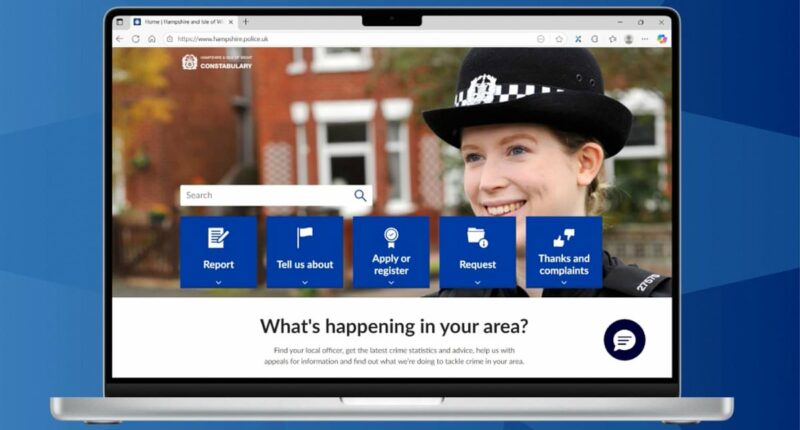Share this @internewscast.com
In a pioneering move, two police forces have unveiled the nation’s first AI police officer, a virtual assistant aptly named ‘Bobbi’. This innovative technology has been introduced by Hampshire and Isle of Wight Constabulary in collaboration with Thames Valley Police, marking a new era in public engagement.
Bobbi is designed to serve as a virtual aide, offering a modern channel for the public to pose non-urgent inquiries. The AI assistant is equipped to handle frequently asked questions, helping to streamline communication between the public and the police.
It’s important to note that Bobbi is not intended for reporting crimes or as a replacement for the emergency 999 service. Instead, it is a tool meant to enhance the accessibility of information and assist with common queries.
The name ‘Bobbi’ is a nod to the term ‘Bobby’, a traditional nickname for police officers that originated from Sir Robert Peel, who founded the Metropolitan police in 1829. This clever naming choice ties the past with the present, as policing steps into the digital age.
A spokesperson for both Hampshire and Isle of Wight Constabulary and Thames Valley Police explained, “Bobbi will communicate in a human-like manner, though it is completely automated.” This trial represents a significant step in integrating artificial intelligence into community service, aiming to improve efficiency and accessibility in law enforcement communication.
A spokesman for Hampshire and Isle of Wight Constabulary and Thames Valley Police said: ‘Bobbi will interact with you like a human, but is entirely automated.
‘This is the first time this technology has been used in policing in the UK and offers an additional service, alongside our online forms, telephone lines and front counters, for those who prefer to use a virtual assistant to ask questions and seek help or advice.’
Bobbi has been tested by more 200 people during its development, including by representatives from victim care groups and independent scrutiny panel members, the forces said in a statement.

Two forces – Hampshire Constabulary and Thames Valley Police – are trialing an AI copper named ‘Bobbi’

Chief Superintendent Simon Dodds, Head of Contact Management for Hampshire and Isle of Wight Constabulary and Thames Valley Police, said Bobbi was a ‘work in progress’
Bobbi will make suggestions and recommendations using the same guidelines and information available to the human call handlers at the forces.
If the virtual assistant is unable to answer a question or if a user states they want to speak to a person, the chat will be directed to one of their ‘digital desk operators – who are all real people’, a spokesman said.
Chief Superintendent Simon Dodds, head of contact management for both forces, said: ‘This is a really exciting time for us as we trial this technology in policing.
‘Locally and nationally, contact into the police increases year-on-year, online and over the phone, and it is important that the valuable skillset of our call handlers and digital desk operators is spent on emergencies and complex, sensitive issues.
‘Empathy, common sense and that intangible gut instinct are some of the many human skills that need to guide our interactions with the public, particularly in their time of need.
‘By providing quick responses to commonly asked, non-emergency questions, Bobbi will enhance our service to our communities, ensuring that every member of the public can get the help they need, whenever they need it.
‘Bobbi will always remain as a work in progress, so whilst we are launching the technology today after an intense building and testing period, our experienced staff will continue to train it to fix any bugs, remain up-to-date with legislation and policies and evolve the technology in line with the needs of our communities.’

An example of how Bobbi can be used to ask questions

Here it gives advice on what to do about noisy neighbours

Bobbi can also provide information about the law. It has been tested by more 200 people during its development, police said
The police are the latest public body to employ the use of AI (artificial intelligence) to cut costs.
But there are fears over its effectiveness and impact on the jobs market.
Earlier this month, a study found one in six employers expect to cut jobs over the next year due to artificial intelligence.
Junior roles will be most at risk as AI is increasingly used to replace them, Chartered Institute of Personnel and Development (CIPD) figures showed.
Elon Musk, the world’s richest man, said working will become optional in just 20 years thanks to advances in artificial intelligence and robotics.
He said the decision to work will become like a hobby such as sport or growing your own vegetables.
And, somewhat curiously for a man worth $360billion, he insisted that money will also become irrelevant in the future.
Mr Musk told the US-Saudi Investment Forum in Washington last week: ‘In 10 to 20 years my prediction is that work will be optional. It’ll be like playing sports or a video game or something like that.
‘If you want to work, [it’s] the same way you can go to the store and just buy some vegetables, or you can grow vegetables in your backyard.’

















